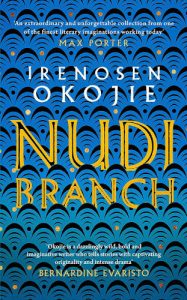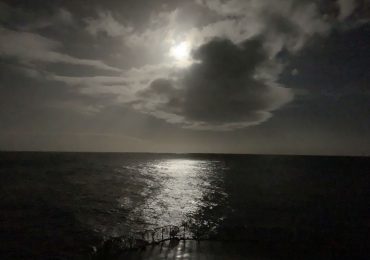Wamuwi Mbao reviews Irenosen Okojie’s Nudibranch, the ‘immersively deranged’ collection containing her 2020 Caine Prize-winning story.

Nudibranch
Irenosen Okojie
Little, Brown, 2019
Short stories are not innately surreal, though the encounter they stage with uncertainty may generate a feeling we have been taught to understand as the experience of the surreal. That feeling betrays our longing for the world to be rendered strange, a longing which expresses itself in a desire for mystery. Accordingly, whether we find a short story satisfying or not depends on how it presents the strange interior world to us—overly legible constructions are not satisfying. But stories with no portal for the reader to climb through are first mystifying, then maddening. Ideally, the surreal should hold up a cracked mirror, through whose crazing we can perceive the squalid weirdness of life.
Nudibranch, the runic third book by Nigerian–British author Irenosen Okojie, follows on from 2016’s Speak Gigantular, but where that collection made its relationship to allegory quite clear, Nudibranch is a disorienting mangrove of allusion and literary experimentalism. Okojie writes towards an impulse that too easily lends itself to the threadbare ‘Magical Realism’ descriptor, but which is recognisable as a particular mode nevertheless, and it makes itself felt as such. You will probably pick up this collection because it contains the short story for which Okojie was awarded the 2020 Caine Prize, ‘Grace Jones’. And the extraordinary prize-winner is indeed a highlight in a curiously clotted collection of stories that feels at times like a narrativised scene from Hieronymus Bosch. Each story has the general shape of a short story—they begin in one place and leave off in psychically different territory—but their content renders them radically unfamiliar. It takes a while to get into the rhythm of life, which abruptly shifts from slow dream–walk to nightmarish chase and into gauzy otherworldliness.
In one sense, Nudibranch is a work of its time. The decade that ends this year saw a resurgence in Black surrealism, which is understandable given the toxic enormities smothering our present. Besides the obvious filmic reprisals in 2018’s Sorry to Bother You and its literary evocation in a host of works such as Lesley Nneka Arimah’s What it Means When a Man Falls From the Sky, the surreal featured everywhere from Ben Okri’s colour-washed fables to Michaela Coel’s stirring comedy, from Beyoncé’s anxiously semaphoring music videos to the provocative scholarship of Christina Sharpe. You can’t find a corner of social media where someone isn’t hymning the genius of Sun Ra. These are all eagerly consumed experiments in describing how Black people experience the world, at a time when ‘the real’—that widely believed untruth—looks very different depending on where you stand.
Figuring out where to stand in relation to Nudibranch is puzzling. The first story, ‘Kookaburra Sweet’, begins strongly enough: ‘Several factors contributed to Kara’s series of self-collisions.’ A lovely and intriguing opening. But then: ‘Several pale, pin-pricked airbags shrank between two victims each time: herself and herself.’ A metaphor that quivers on the verge of over-explaining. And then we are told that
the airbags wouldn’t have been necessary if she hadn’t missed her original flight at Sydney airport because her mobile died, which meant no alarm to wake her up. If there hadn’t been an issue settling her hostel bill, since the front-desk clerk claimed there was a problem with her Barclaycard, which meant pretending to enter one of the empty pool-rooms to call Barclays but slipping into the toilets instead.
Kara escapes clumsily through a window into the streets of Sydney, and there begins a strangely braided story whose meaning seems to lag behind: she wakes back in the UK to find that she has been transformed into licorice, and what unspools from there is truly bizarre.
There are details in Okojie’s stories that connote the surreal: brief encounters with wealthy strangers, oddly hued tongues, an abnormal child slams his hand into a car door repeatedly, the pain lagging torporously behind the act. But the nagging sense I felt while reading these stories is that while they are profoundly original, they don’t all manage the tension between surreal excess and its necessary packaging in prose. The exceptions are notable: ‘Grace Jones’, latterly fêted by Maison de Caine, is about a woman from Martinique named Sidra who works as an impersonator of the celebrity. Sidra drifts through a satirically rendered world of louche parties, haunted by memories of an appalling Grenfell-like tragedy. The story peels back layers of societal cruelty, and if Okojie is occasionally too quick to resolve some of her other stories, here the pacing is spot-on.
The sense, then, is of an author writing through the surreal as a way of plunging down to the unconscious. But replicating in fiction what eludes logic is as challenging as creating a perfume. The surreal is the base note that gives the short story its unusual scent. Surrealism in fiction always overspills—the effect of the surreal is only achieved by using the merest trace of it. That is to say, it is an effect achieved by domesticating the strange world of dreams—giving that world the appearance of being wild in order for it to be made knowable during the reading. The truly surreal has no handle by which to make its grammar knowable: gratuitous, anarchic, disobedient to the logic of the observable world.
That’s all well and good, but does it make for readable fiction? In some of Okojie’s stories, the detail in each line is so idiosyncratically compacted that it becomes inimical to the affective sweep of the story. Meaning-making is a frustratingly staccato exercise. Here is a character in the otherwise beguiling ‘Saudade Minus One (S-1=)’:
Elmira wanted to say she had other clothes stored in her barn she thought might fit him. Clothes she laid out for parts of her visions to try on, only for them to find them inadequate and fold them away beneath bales of hay in case she wanted to feed them to her vision of the snorting bull falling from the lines of the roof. A split, hungry creature identified after it passed through fleetingly.
If this gives the impression of being excerpted at random, or needing more to be included to give greater context, nothing could be further from the truth. Aside from my churlish suspicion that meaning is running away with itself, the tediously entangled repetition of ‘them’ suggests under-editing. In more than one story, Okojie produces writing where each sentence impels meaning onward without any seeming connection to the previous line, which is intriguing, but soon becomes a bit like background music that intrudes uncomfortably into the conversation.
In ‘Point and Trill’, one of Nudibranch’s grislier stories, an alienated couple are driving up to a holiday cabin for a paintballing getaway with a childhood friend. All the familiar heteronormative conventions present themselves, along with many of the filmic ones: strained intimacy, the awkwardness of feeling like the relationship will be saved or scuppered by the event. It’s Who’s Afraid of Virginia Woolf?, except (in a darkly comic slippage of meaning), there’s an actual wolf (sort of). There are readerly irritations at the base level—how, when they are driving down a rural Welsh road at night, is the woman able to fish a magazine from the glovebox and flick through its pages? But these are forgotten as the story abruptly transitions from the realm of awkwardness and misunderstanding into an actual grotesque horror, where the familiar and the domestic are brutally torn apart. Okojie takes a tendency in realist storytelling—the navel-gazing desire we have to know that other couples are just as normal or weird or dysfunctional as we are—and shatters it stunningly.
The best stories in Nudibranch render fantasy inseparable from the everyday, and make meaning plastic. They exorcise into the waking world the interior phenomena of the kind that we most often experience involuntarily. Okojie’s effortfully unusual writing is, for all that it dislocates, also curiously moving. Her writing militates against seriousness, a trait that is also traceable in her debut, the 2015 novel Butterfly Fish. The ludic dimension in the writing there was indebted to the tradition and shaping of Nigerian story-craft, but the stories in Nudibranch stroke against the grain of the abstract. These stories are immersively deranged, in the same way that drowning is immersive. If you’re an adventurous reader, you will find enjoyment in being perplexed. The creative bedlam isn’t for everyone, but its eccentricity is also its strength, unsettling the way suddenly being entangled in a spider’s web might be to some. Struggling against it may not be the best strategy.
- Wamuwi Mbao is an essayist, cultural critic and academic at Stellenbosch University. Follow him on Twitter.





